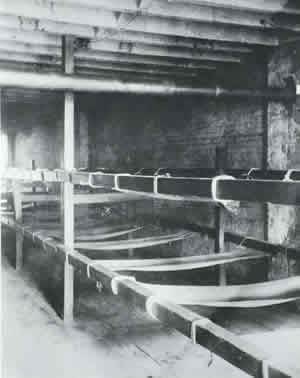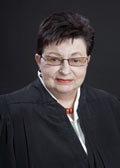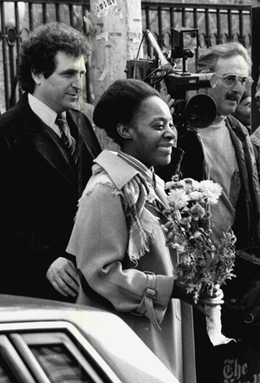Related Research Articles

A flophouse or dosshouse is a place that offers very low-cost lodging, providing space to sleep and minimal amenities.

Universal City Studios, Inc. v. Corley, 273 F.3d 429, was a court ruling at the United States Court of Appeals for the Second Circuit. The ruling was the first significant test of the anti-circumvention provisions of the Digital Millennium Copyright Act.
The Handschu agreement is a set of guidelines that regulate police behavior in New York City with regard to political activity.

Marilyn Hall Patel is a former United States district judge of the United States District Court for the Northern District of California.

The Supreme Court of the United States handed down sixteen per curiam opinions during its 2005 term, which lasted from October 3, 2005, until October 1, 2006.
Coalition for the Homeless is a not-for-profit advocacy group focused on homelessness in New York. The coalition has engaged in landmark litigation to protect the rights of homeless people, including the right to shelter and the right to vote, and also advocates for long-term solutions to the problem of homelessness. Formed in 1981, the Coalition has offices in New York City and Albany, New York.

Joyce Patricia Brown, also known as Billie Boggs, was a homeless woman who was forcibly hospitalized in New York City in 1987. She was the first person hospitalized under a Mayor Ed Koch administration program which expanded the city's ability to forcibly commit homeless New Yorkers to psychiatric hospitals. Between 1987 and 1988, Brown worked with the New York Civil Liberties Union to challenge her hospitalization in a case which attracted significant media attention. During the ensuing trial, her lawyers argued that her behaviors were not in line with social expectations but did not rise to the level of posing a danger to herself or others. Brown took the stand, and her clarity while testifying became part of the public conversation. The trial ended in her favor, and while the city won on appeal she was ultimately released after a subsequent case determined that the city could not forcibly medicate her. Following her release, she made several television appearances and spoke about homelessness at Harvard Law School, but came to avoid the press. Her case sparked national conversations about how best to care for the people with mental illnesses.
Pearson v. Callahan, 555 U.S. 223 (2009), was a case decided by the United States Supreme Court dealing with the doctrine of qualified immunity.
Marino v. Ortiz, 484 U.S. 301 (1988), was a United States Supreme Court case which resulted from a lawsuit filed by 350 New York City police officers that pitted the Equal Protection Clause of the Fourteenth Amendment against Title VII of the Civil Rights Act of 1964.
Hollingsworth v. Perry was a series of United States federal court cases that re-legalized same-sex marriage in the state of California. The case began in 2009 in the U.S. District Court for the Northern District of California, which found that banning same-sex marriage violates equal protection under the law. This decision overturned California ballot initiative Proposition 8, which had banned same-sex marriage. After the State of California refused to defend Proposition 8, the official sponsors of Proposition 8 intervened and appealed to the Supreme Court. The case was litigated during the governorships of both Arnold Schwarzenegger and Jerry Brown, and was thus known as Perry v. Schwarzenegger and Perry v. Brown, respectively. As Hollingsworth v. Perry, it eventually reached the United States Supreme Court, which held that, in line with prior precedent, the official sponsors of a ballot initiative measure did not have Article III standing to appeal an adverse federal court ruling when the state refused to do so.

The New York City Department of Homeless Services (DHS) is an agency within the government of New York City that provides services to the homeless, though its ultimate aim is to overcome homelessness. The guiding principles of the department were outlined at a 1992 New York City Commission on the Homeless: to operate an emergency shelter system for people without housing alternatives, provide services and resources to assist shelter residents in gaining independent housing, and partner with local agencies and non-profits to provide these services. Its two rules are compiled in title 31 of the New York City Rules; state regulations are primarily compiled in title 18 of the New York Codes, Rules and Regulations.
Arizona Free Enterprise Club's Freedom Club PAC v. Bennett, 564 U.S. 721 (2011), is a decision by the Supreme Court of the United States.

The Bowery Mission is a 501(c)(3) nonprofit that provides hot meals, overnight shelter, and faith-based residential programs for New Yorkers experiencing homelessness. Its purpose statement reads: "The Bowery Mission exists to promote the flourishing of New Yorkers overcoming homelessness and marginalization."

Hedges v. Obama was a lawsuit filed in January 2012 against the Obama administration and members of the U.S. Congress by a group including former New York Times reporter Christopher Hedges, challenging the National Defense Authorization Act for Fiscal Year 2012 (NDAA). The legislation permitted the U.S. government to indefinitely detain people "who are part of or substantially support Al Qaeda, the Taliban or associated forces engaged in hostilities against the United States". The plaintiffs contended that Section 1021(b)(2) of the law allows for detention of citizens and permanent residents taken into custody in the U.S. on "suspicion of providing substantial support" to groups engaged in hostilities against the U.S. such as al-Qaeda and the Taliban respectively that the NDAA arms the U.S. military with the ability to imprison indefinitely journalists, activists and human-rights workers based on vague allegations.
Yvonne McCain was the lead plaintiff in a lawsuit, which led to a landmark ruling in 1986 by the Appellate Division of the State Supreme Court in Manhattan, stating that New York City could not deny emergency shelter for homeless families with children. However, the case was not settled until 2008, when it was settled by New York City and the Legal Aid Society. The McCain case was settled in 2008 in the Boston v. City of New York case, and the settlement upheld the legal right to shelter for homeless families and children.
Masterpiece Cakeshop v. Colorado Civil Rights Commission, 584 U.S. ___ (2018), was a case in the Supreme Court of the United States that dealt with whether owners of public accommodations can refuse certain services based on the First Amendment claims of free speech and free exercise of religion, and therefore be granted an exemption from laws ensuring non-discrimination in public accommodations—in particular, by refusing to provide creative services, such as making a custom wedding cake for the marriage of a gay couple, on the basis of the owner's religious beliefs.
Robert M. Hayes is the president of Community Healthcare Network since 2014. Before working in healthcare, Hayes primarily worked in law at multiple firms throughout the United States from 1977 to 2001. During his law career, Hayes started the 1979 lawsuit Callahan v. Carey where he was ruled in favor of making New York homeless shelters available based on the New York Constitution.
In September 2021, an average of 47,916 people slept in New York City's homeless shelters each night. This included 18,236 single adults, 14,946 children, and 14,734 adults in families. The total number peaked in November 2018, with 63,636 people sleeping in homeless shelters. Since March 2020, the number of people sleeping in shelters has declined significantly, likely an effect of the COVID-19 pandemic. The city reported that in 2019, 3,600 individuals experienced unsheltered homelessness, sleeping in public spaces such as streets and public transit rather than shelters.

Martin v. Boise was a 2018 decision by the U.S. Court of Appeals for the Ninth Circuit in response to a 2009 lawsuit by six homeless plaintiffs against the city of Boise, Idaho regarding the city's anti-camping ordinance. The ruling held that cities cannot enforce anti-camping ordinances if they do not have enough homeless shelter beds available for their homeless population. It did not necessarily mean a city cannot enforce any restrictions on camping on public property.
Allen v. Milligan, 599 U. S. ___ (2023), is a United States Supreme Court case related to redistricting under the Voting Rights Act of 1965 (VRA). The appellees and respondants argued that Alabama's congressional districts discriminated against African-American voters. The Court ruled 5–4 that Alabama’s districts likely violated the VRA, maintained an injunction that required Alabama to create an additional majority-minority district, and held that Section 2 of the VRA is constitutional in the redistricting context.
References
- 1 2 3 4 5 6 7 8 Ian Frazier, "Hidden City", The New Yorker , October 28, 2013; reprinted in Hogs Wild: Selected Reporting Pieces, New York: Farrar, Straus and Giroux, 2016, ISBN 9781250132154.
- ↑ Mary Ellen Hombs, American Homelessness: A Reference Handbook, Contemporary World Issues, 2nd ed. Santa Barbara, California: ABC-CLIO, 1994, ISBN 0-87436-725-5, p. 28.
- 1 2 3 4 Donna Wilson Kirchheimer, "Sheltering the Homeless in New York City: Expansion in an Era of Government Contraction ", Political Science Quarterly 104.4 (Winter 1989-1990) 607-23, p. 620.
- 1 2 Callahan v. Carey, No. 42582/79, New York Superior Court, New York County; ESCR.net.
- 1 2 3 4 5 Maria Foscarinis, "The Evolution of Homelessness: Trends and Future Directions", in Robert Hartmann McNamara, ed., Homelessness in America, Volume 3: Solutions to Homelessness, Westport, Connecticut / London: Prager, 2008, ISBN 978-0-275-99561-4, pp. 113–32, pp. 115–16.
- ↑ Sara H. Strauss and Andrew E. Tomback, "Homelessness: Halting the Race to the Bottom", Yale Law & Policy Review 3.2 (Spring 1985) 551–70, p. 554, note 14.
- ↑ J. Phillip Thompson, "The Failure of Liberal Homeless Policy in the Koch and Dinkins Administration", Political Science Quarterly 111.4 (Winter 1996-1997) 639–60.
- ↑ "L.A. County now has 58,000 homeless people. So why are there thousands fewer shelter beds than in 2009?". Los Angeles Times. 2017-09-29. Retrieved 2023-06-14.